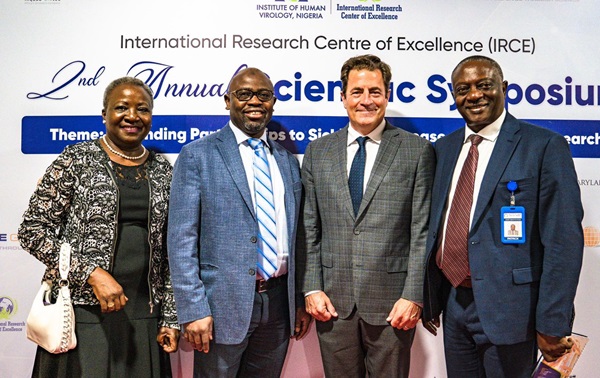
The International Research Centre of Excellence (IRCE) at the Institute of Human Virology Nigeria (IHVN) recently hosted a pivotal symposium focused on advancing care and research for patients with sickle cell disease (SCD).
The event, held during the second Annual Scientific Seminar of IRCE, gathered experts to discuss the latest advancements in the diagnosis, treatment and innovative research surrounding SCD and cancer.
Since its establishment in 2015, the IRCE has played a crucial role in advancing research in Nigeria by leveraging IHVN’s infrastructure and expertise. The centre has undertaken more than 40 funded research grants targeting both infectious and non-infectious diseases, emphasising its commitment to addressing health challenges through high-quality, culturally sensitive research.
This year’s symposium, themed “Expanding Partnerships in Sickle Cell Disease (SCD) and Cancer Research,” attracted a wide array of local and international experts. Discussions centered on the latest advancements in care, treatment, and innovative research, especially in the areas of SCD and cancer, which are critical health challenges in Nigeria.
Dean of the University of Maryland School of Medicine and Vice President for Medical Affairs at the University of Maryland Baltimore, Dr. Mark Gladwin presented on the severe impact of pulmonary hypertension (PH) and end-organ failure in adults with SCD. He emphasised that chronic hemolytic anemia in SCD patients leads to vascular damage, causing complications such as PH. Gladwin highlighted groundbreaking research findings on the role of cell-free hemoglobin and its detrimental effects on blood vessels, exacerbating the risk of PH.
One of the most notable studies presented was from Dr. Prithu Sundd’s laboratory, which demonstrated how oxidative hemoglobin triggers neutrophil extracellular traps (NETs) in pulmonary arterioles, further complicating SCD management. The research suggested that NETs, circulating from other organs, contribute significantly to lung damage in SCD patients.
Gladwin also discussed the SCD-CARRE trial, which explores the efficacy of Red Blood Cell (RBC) exchange transfusion as an intervention to limit disease progression and improve outcomes in high-risk SCD patients. Preliminary findings indicate that this therapy may reduce vaso-occlusive crises and acute chest syndrome, both of which are major contributors to pulmonary complications and right heart failure. He emphasised the need to identify high-risk subgroups among SCD patients, particularly those with chronic kidney disease (CKD) or elevated biomarkers, who are at high risk of mortality. The ongoing trial aims to refine therapeutic approaches for these vulnerable patients, with the ultimate goal of improving survival rates.
The discussions at the symposium also underscored the urgent need for consensus on the use of RBC exchange transfusion in SCD patients with progressive end-organ dysfunction and the development of novel therapeutic strategies for managing PH in this population. Innovative tools like the ‘Painimation’ app were highlighted for their potential to improve the assessment and management of pain, a significant issue in SCD care.
Chief executive officer of IHVN, Dr. Patrick Dakum outlined the strategic direction of IHVN, emphasising the importance of expanding partnerships that include both public and private sectors, as well as faith-based organisations. These partnerships are seen as crucial for contributing to the broader health sector under the national healthcare plan. Dakum underscored IHVN’s commitment to expanding research in cancer and sickle cell disease, noting that collaboration with international institutions like the University of Maryland and the Nigerian Sovereign Investment Authority is essential for advancing research and capacity building in these areas.
He stressed the importance of a public-private mix in research initiatives, aiming to leverage the strengths of both sectors to achieve more comprehensive and effective outcomes in healthcare. Dakum also mentioned that the appointment of a special adviser on sickle cell disease by the Minister of Health signals a significant shift in government attention towards neglected diseases, including sickle cell. This move is seen as a crucial step in ensuring that such diseases receive the necessary focus and resources.
Earlier, executive director of IHVN’s IRCE, Prof. Alash’le Abimiku emphasised the need to bring sickle cell disease, particularly as it disproportionately affects Black individuals, into the limelight alongside cancer. She highlighted that both conditions are under-recognised in terms of prevention and treatment and acknowledged the challenges faced by low- and middle-income countries in prioritising health issues. Abimiku suggested that critical conditions like sickle cell disease and cancer can be overlooked amidst many challenges.
Abimiku pointed out that Nigeria needs to do better in focusing on cancer prevention, including diet, exercise, and other lifestyle factors, rather than just treating the disease after it occurs. She noted that the government is setting up additional cancer treatment centers and diagnostic facilities, highlighting efforts to improve cancer care in the country. Abimiku expressed hope that events like the symposium would bring more attention to sickle cell disease, which is particularly devastating to young people in Nigeria.
She also stressed the importance of partnerships with institutions like the National Institute for Pharmaceutical Research and Development (NIPRD) to conduct clinical trials and potentially discover a cure for sickle cell disease. Abimiku mentioned that the minister’s task force on sickle cell disease reflects a governmental commitment to increasing awareness and addressing the disease more effectively.


